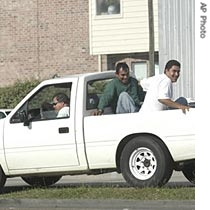-
(单词翻译:双击或拖选)
THIS IS AMERICA - A Nation of Immigrants, Divided Over the Subject of Immigration
Debate centers on millions of illegal immigrants in the country. The U.S. Congress has failed to agree on a reform plan, so states are passing their own laws. Transcript1 of radio broadcast:
02 March 2008
VOICE ONE:
Welcome to THIS IS AMERICA in VOA Special English. I’m Faith Lapidus.
VOICE TWO:
And I'm Steve Ember. Our subject this week is immigration.
(MUSIC)
VOICE ONE:
 |
| Many immigrant families entered the United States through Ellis Island in New York Harbor |
Just about every family in the United States has at least one member, now or in the past, who came from another country. Even American Indians may have immigrant ancestors through marriage.
The United States is one of the few industrial countries with a growing population. The main reason is immigration. Today America has just over three hundred million people. A new report says if current growth rates continue, the nation will have four hundred thirty-eight million in two thousand fifty.
VOICE TWO:
The Pew Research Center says more than eighty percent of the increase will be the result of immigrants and their American-born children or grandchildren. Non-Hispanic whites are expected to be a minority, forty-seven percent of the population, in two thousand fifty.
Hispanics are currently the nation's largest ethnic2 minority. By the middle of the century, their number is expected to double to twenty-nine percent of the population.
VOICE ONE:
The Census3 Bureau estimates the foreign-born population of the United States at twelve percent as of two thousand four. Just over half the people were born in Latin America, twenty-five percent in Asia and fourteen percent in Europe. The remaining eight percent were from Africa and other areas.
Last year, six hundred fifty thousand immigrants became American citizens. Yet even a nation of immigrants can find itself divided by the issue of immigration, especially when the economy is not doing well.
But the concerns expressed in public debate are usually not so much about immigration itself but about illegal immigration. An estimated eleven million or more people are in the United States without permission. Most of them came across the borders with Mexico or Canada illegally. Others came to the United States on a temporary visa and never went home.
VOICE TWO:
Supporters of stronger immigration laws say illegal immigrants use health care and public education systems without paying their fair share. They say undocumented workers push down wages in some jobs, like in the building industry.
But others argue that illegal immigrants put money into local economies and often have taxes taken out of their wages. Yet because their employment is against the law, it often involves identity theft to create false documents. That crime hurts innocent people whose identities were stolen.
VOICE ONE:
 |
| Immigrant rights activists4 demonstrating in Los Angeles in 2007 for immigration reform |
But a new report suggests that fears of immigration as a threat to public safety are unjustified. The Public Policy Institute of California released a study done in that state.
In California, people born outside the United States represent about thirty-five percent of the adult population. But researchers found that immigrants represent only about seventeen percent of the state prison population.
Still, supporters of stronger laws point out that some communities face greater problems than others with crime by illegal immigrants.
VOICE TWO:
Debates about illegal immigration often go round and round like this:
VOICE ONE:
Employers have trouble finding Americans to take low-paying jobs so they need immigrants.
VOICE TWO:
Maybe, but employers will never raise wages as long as they can find people willing to work for less.
VOICE ONE:
Maybe, but if wages go up, so will prices, and that will create other problems.
VOICE TWO:
 |
| Two day laborers6 are picked up near a day labor5 center in Houston, Texas |
Such arguments are nothing new. What is new is that immigrants are moving beyond big states like California, Texas or New York. They are settling all across the country, in big cities as well as small towns.
These new residents are bringing cultural changes to many areas. Some of these changes are welcome, others are not. Tensions may develop, often in reaction to an issue like day laborers. These are groups of men who stand on the street, often outside home improvement centers, hoping for a day's work. Many of these workers are illegal immigrants.
VOICE ONE:
Language can also be a divisive issue when immigrants are seen as slow to learn English. Yet English classes are often in such demand they have waiting lists.
In the year two thousand, eighteen percent of people in the United States over age five spoke7 a language other than English at home. By two thousand six the Census Bureau says the number was twenty percent.
(MUSIC)
VOICE TWO:
Many people say the immigration system is broken. But few can agree on how to fix it.
Some say illegal immigrants who have lived and worked in the United States for some time should have a chance to become legal residents. For one thing, they say it would be impossible to arrest eleven million people and send them all home.
Others are against a path to legal residency if they see it as amnesty, pardoning millions of people who entered the country illegally. For one thing, they say it would be unfair to those who follow the process to come here legally.
The last time there was an amnesty for illegal immigrants was in nineteen eighty-six.
VOICE ONE:
Usually, the only punishment for being in the country illegally is expulsion, unless a person was arrested on other charges. Technically8 it is not even considered a criminal offense9. Congress' efforts to rewrite immigration laws last year included hotly debated proposals to criminalize illegal immigration. In the end Congress failed to pass an immigration reform plan.
VOICE TWO:
In the presidential campaign, the major candidates appear to share fairly similar positions on illegal immigration.
Democratic senators Hillary Clinton and Barack Obama both supported an immigration bill that failed in the Senate last year. The reform legislation would have provided a path to legal residency and citizenship10 for some illegal immigrants.
The bill was supported by President Bush. And it was co-sponsored by Senator John McCain, the expected Republican presidential nominee11.
VOICE ONE:
American immigration history presents a pattern of history repeating itself. Hard times or conflict in other countries lead people to seek a better life in America. When groups of Americans begin to feel threatened, the federal government moves to restrict immigration.
These days, the government does not seek to restrict immigration so much as manage it. That was how a spokesman for the Office of Citizenship and Immigration Services described it
But with Congress unable to agree on immigration reform, states are not sure what to do.
VOICE TWO:
Enforcing immigration law is the responsibility of the federal government. But state and local officials say the government is not doing enough, so they are taking action on their own.
For example, a new law took effect January first in the southwestern state of Arizona. It bans businesses from hiring people known to be in the country illegally, and cancels their operating licenses12 if they do.
Business groups in Arizona appealed the new measure. They said only the federal government can enforce immigration laws. In early February, a federal judge rejected their argument. The judge said the Arizona law did not conflict with federal powers because states are responsible for licensing13 businesses.
But courts in other states have ruled differently in similar cases. Last year, a federal judge ruled against a local law in the city of Hazleton, Pennsylvania. The law would have denied permits to businesses that hire illegal immigrants. In Missouri, however, a judge upheld such a measure.
VOICE ONE:
The National Conference of State Legislatures says immigration is being debated in all fifty state capitols. Last year, forty-six states passed two hundred forty laws related to immigrants. That was almost three times as many laws as in two thousand six.
The new laws deal with subjects like driver's licenses, employment and public benefits. The legislation affects legal as well as illegal immigrants. States are acting14 in policy areas including education, health care, human trafficking and law enforcement.
With the economy slowing, state and local governments are likely to feel more pressure to provide services to legal residents only.
VOICE TWO:
So how does someone legally move to the United States? This is a common question from listeners. We will answer it next week.
(MUSIC)
VOICE ONE:
Our program was written by Nancy Steinbach and produced by Caty Weaver15. I’m Faith Lapidus.
VOICE TWO:
And I’m Steve Ember. Transcripts16, MP3s and podcasts of our programs are at voaspecialenglish.com. Join us again next week for THIS IS AMERICA in VOA Special English.
 收听单词发音
收听单词发音
1
transcript

|
|
| n.抄本,誊本,副本,肄业证书 | |
参考例句: |
|
|
|
2
ethnic

|
|
| adj.人种的,种族的,异教徒的 | |
参考例句: |
|
|
|
3
census

|
|
| n.(官方的)人口调查,人口普查 | |
参考例句: |
|
|
|
4
activists

|
|
| n.(政治活动的)积极分子,活动家( activist的名词复数 ) | |
参考例句: |
|
|
|
5
labor

|
|
| n.劳动,努力,工作,劳工;分娩;vi.劳动,努力,苦干;vt.详细分析;麻烦 | |
参考例句: |
|
|
|
6
laborers

|
|
| n.体力劳动者,工人( laborer的名词复数 );(熟练工人的)辅助工 | |
参考例句: |
|
|
|
7
spoke

|
|
| n.(车轮的)辐条;轮辐;破坏某人的计划;阻挠某人的行动 v.讲,谈(speak的过去式);说;演说;从某种观点来说 | |
参考例句: |
|
|
|
8
technically

|
|
| adv.专门地,技术上地 | |
参考例句: |
|
|
|
9
offense

|
|
| n.犯规,违法行为;冒犯,得罪 | |
参考例句: |
|
|
|
10
citizenship

|
|
| n.市民权,公民权,国民的义务(身份) | |
参考例句: |
|
|
|
11
nominee

|
|
| n.被提名者;被任命者;被推荐者 | |
参考例句: |
|
|
|
12
licenses

|
|
| n.执照( license的名词复数 )v.批准,许可,颁发执照( license的第三人称单数 ) | |
参考例句: |
|
|
|
13
licensing

|
|
| v.批准,许可,颁发执照( license的现在分词 ) | |
参考例句: |
|
|
|
14
acting

|
|
| n.演戏,行为,假装;adj.代理的,临时的,演出用的 | |
参考例句: |
|
|
|
15
weaver

|
|
| n.织布工;编织者 | |
参考例句: |
|
|
|
16
transcripts

|
|
| n.抄本( transcript的名词复数 );转写本;文字本;副本 | |
参考例句: |
|
|
|















